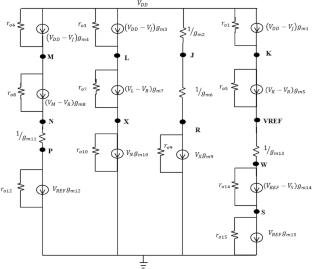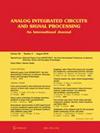A low-temperature coefficient, low power, and area-efficient temperature-compensated CMOS voltage reference for energy harvesting systems
Abstract
A simple all-MOS transistor-based voltage reference without using any passive resistor or amplifier is presented in this paper. The temperature compensation has been achieved by utilizing a sequence of composite NMOS transistors, to attain a low-temperature coefficient reference voltage across an extensive range of temperatures. Since temperature compensation in the proposed voltage reference has been attained by using only three NMOS transistors rather than the larger compensation circuits, it reduces the area consumption while still attaining the minimal temperature coefficient. Achieving a temperature coefficient of less than 10 ppm/°C is a common goal for BJT-based voltage references while the proposed voltage reference can achieve this goal using only the MOS transistors with standard threshold voltages. The proposed temperature-compensated CMOS voltage reference has been simulated in 180 nm which delivers an output reference voltage of 451.2 mV. Measurement outcomes show that the suggested circuit works for an extensive range of temperatures from − 40 °C to 140 °C with a minimum temperature coefficient of 7.5 ppm/°C which is the feature of the BJT-based BGR. The power supply rejection ratio for the frequency range of 1 Hz–10 kHz is obtained as − 53.81 dB and the line sensitivity is computed as 0.35%/V. The output noise is 0.51 µV/√Hz at 1 Hz. Moreover, at ambient temperature, the area and power consumed by the proposed circuit are 0.000428 mm2 and 0.7 µW, respectively.


 求助内容:
求助内容: 应助结果提醒方式:
应助结果提醒方式:


